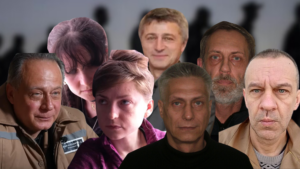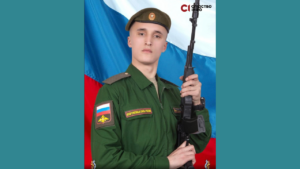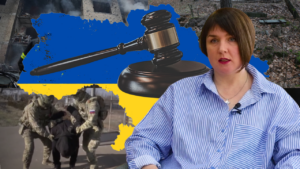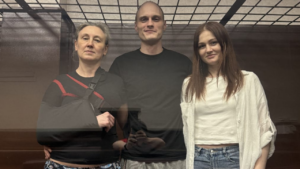“I do not identify with the defendant — I am here to ensure the balance of justice and fairness”, — the lawyer of the Russian military
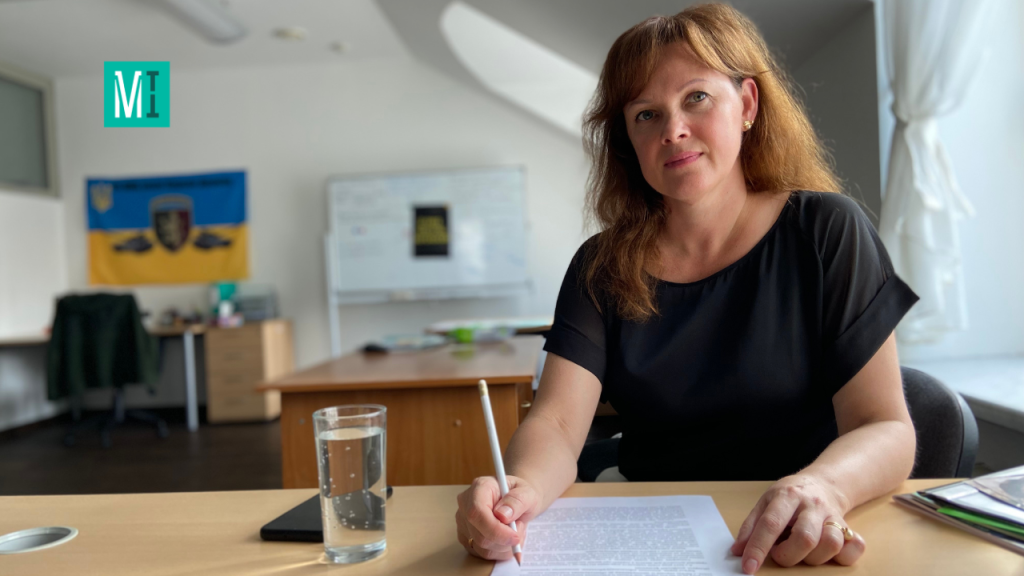
Yuliia Shuliak is a Ukrainian lawyer who represents Russian military personnel accused of war crimes in court. She has worked in the courts since 2017 and was previously an associate professor at the Department of Criminal Law at the National Academy of Internal Affairs. Initially, Yuliia got her first degree as an economist specializing in international relations. She started collaborating with the Free Secondary Legal Aid Center in 2021. Before Russia’s full-scale invasion, she used to handle general criminal cases. Since 2023, Yuliia has been representing Russian military personnel in Ukrainian courts under the Center’s mandate.
In an interview with MIHR, the lawyer talks about her experience working on war crimes cases, the challenges of the trial in absentia, the impact of an international educational project on her perception of her work, and the public condemnation.
What was your first case in which you represented a Russian military man as a lawyer?
— It was a case involving a high-ranking officer accused of giving orders that violated the Geneva Conventions. The trial began in 2023 at the Irpin City Court and is ongoing. This case concerns our military personnel and civilians who were taken prisoner, held in improper conditions, and then transferred to another country. I can only provide general information, but I cannot comment on the case itself as I do not have the authority from my client to disclose details. This is a matter of lawyer’s ethics.
What challenges did you encounter when you first started handling cases under Article 438 of the Ukrainian Criminal Code that deals with violations of the laws and customs of war?
— Firstly, we didn’t understand the extent of the defense required. The specificity of these crimes is that the provisions of Article 438 of the Criminal Code of Ukraine are blanket; they refer to international law, international humanitarian law, and international human rights law. International law focuses more on the victim than the accused, while we pay more attention to the defendant.

According to the publication Judiciary of Ukraine, currently, Ukrainian courts are considering 291 cases under Article 438 of the Criminal Code dealing with violations of the laws and customs of war. 85% of them are heard in absentia.
Secondly, in general criminal cases where the suspect or accused is physically present, we ask them to describe their actions. However, in absentia cases, where people directly involved at the crime scene are not identified, we focus on the testimonies of victims and witnesses. As a lawyer, I haven’t had direct contact with the accused, which adds to the complexity of the process.
You mentioned that you were unsure about the extent of the defense. Could you please explain what you mean?
— For instance, in my first case, the prosecutor asked about the circumstances from February 24, 2022, until the prisoners were transferred to another country, almost until March. During this period, my client was seen by different people—some saw him only once, others twice. If we interrogated victims only on the instances when they saw or heard anything related to the crime, the questioning would only last a couple of minutes.
It was crucial to distinguish between the image of the accused as perceived by the victims and the actual person. Victims may describe a composite image rather than a specific individual. For instance, they might have been in captivity, interrogated, and later seen media coverage. This can merge into their memories of the person and event. My task was to separate who they saw then from who is now presented as the accused.
How many cases have you had under Article 438 of the Criminal Code of Ukraine?
— Three so far. These are all the cases I have related to war crimes. Due to conflicts of interest among the participants, I have declined some cases—for example, when a commander and their subordinate were involved in the same case. Because if we assume that they are detained, they may testify against each other, which constitutes a potential conflict of interest.
On the problems of the in absentia process
Let’s discuss the stages of a case, as specific challenges can arise at each stage. For example, about delivering charges to Russians. How is this handled?
— Yes, we have many issues with this because, for processes in absentia, the Criminal Procedure Code of Ukraine provides for notification of suspicion through the newspaper “Uriadovyi Kurier” [literally Governmental Courier] and on the Judicial Authority’s website. Initially, the approach was quite formal. From the perspective of international law, it is necessary to inform the individual about the legal proceedings against them and obtain confirmation that they are really aware of it. They must know not only theoretically – they must understand what they are suspected or accused of. This notification must be done by any means: via email, messaging apps, correspondence, or even through the media. It is advisable to get a response from the person acknowledging their awareness.
What about the workload of the courts due to their lack of specialization? For example, we see many cases in the Irpin City Court. Much is said about the impact on the quality of work of prosecutors and judges. However, the defense is not often mentioned in this context.
— The defense also faces difficulties due to limited time to consider cases. For example, judges sometimes dismiss questions posed by the defense attorney. Prosecutors, having more information from victims or witnesses, can ask targeted questions to prove the accusation. The defense attorney often proceeds without prior knowledge during the examination. We can talk to neither the witness nor the victim beforehand, meeting them for the first time in the courtroom. We can ask general questions to get oriented and then move on to specific questions that could undermine the accusation. However, judges may not recognize this need and dismiss these questions due to the time limit. This would not happen if we could speak with the victims and witnesses in advance to clarify the needed information.
Working with victims or witnesses is likely different now than before the full-scale war. For instance, there is more frequent mention of a victim-centered approach in these cases.
— Yes, there is more focus on victims now, and questions have become more carefully considered to avoid causing harm or emotional distress. People have experienced traumatic events, and there are no simple situations in courts these days. We work hard so that the victim does not feel attacked or negatively affected by the attorney. We want the victim to see the attorney as someone seeking confirmation of whether the event was related to the defendant. We try to talk more about unemotional aspects, avoiding painful memories, such as torture or inhumane treatment. It is crucial to work with victims so they don’t become aggressive or withdrawn, allowing them to open up during the court process.
Have you encountered any cases involving aggression, for instance?
— No, not a single time. From the beginning, I try to ask questions in a way that does not provoke aggression. It is probably a result of years of experience. I have talked to attorneys representing victims, and we have tried to express our views and understand the behavior. We have moved from extreme positions towards a more balanced approach. This comes with experience.
International experience in The Hague
In June 2024, you traveled to The Hague as a joint project involving UBA, USAID, and UHHRU. What happened during this trip?
— The trip included 18 people—prosecutors, judges, and attorneys. We observed how the process for prosecuting high-ranking officials should proceed and what support we have from international partners.
On the first day, we visited the ICC and observed the court proceedings. For example, we saw how prosecutors, attorneys, and judges were arranged in the courtroom, which is crucial to the process. I was impressed by the work of the attorney. In Ukrainian courts, attorneys have to work quickly. There, the attorney worked slowly, was calmly listened to without interruptions, and took notes quietly. I appreciated the quiet pace and specificity.

Yuliia Shuliak at the International Criminal Court in The Hague
We also visited the office working on the Register of Damages for Ukraine. They explained that it was created to show the massive scale of the destruction, so it is crucial for every person who has lost property to enter the data into the Register. This will reveal the extent of the damage caused by the Russian forces.
And for a few more days, we attended training at the ASSER Institute. We were taught how to investigate crimes, conduct prosecutions, and provide defense in the context of international crimes. We were also introduced to new methods for investigation, evidence gathering, identifying individuals, and issuing charges or indictments. For example, we learned how to use regular Google Maps to determine locations and work with particular programs and open sources. Such OSINT methods are crucial for attorneys to verify information and for prosecutors to gather evidence.
Which aspects of international humanitarian law and international criminal law regarding war crimes did you hear about for the first time?
— For me, the revelation was the approach to evidence management. Europe has advanced significantly in this area. For example, while witness testimonies can be primary evidence in our system, the ICC places a much stronger emphasis on material evidence, even though witness testimonies are also crucial to them. They focus more on digital evidence and metadata verification. In our system, it’s often enough to print a photo or screenshot from a flash drive, describe it, and it can be accepted as evidence. The Ukrainian Criminal Procedure Code does not have specific provisions for preserving digital evidence. However, the ICC thoroughly checks whether the information is authentic and how it was created.
How did this trip change your perception of the processes and your role in them?
— We attended the Tribunal for the Former Yugoslavia, and being in its walls gave me a deep understanding of the efforts done at the international level to prevent such crimes or hold perpetrators accountable. People who commit crimes against peace, security, and humanity, war crimes, will face real consequences. This visit provided the prospect that a tribunal would also be established for crimes committed in Ukraine.
It also made us realize that each individual’s work must be professional and free from political influence. If we defend someone, we must do so based on the evidence. The court must make decisions following the balance of justice: the evidence provided by the prosecution must be thoroughly verified, and the role of the defense attorney in such cases should not be reduced to that of a mere observer. The attorney must take an active stance.
Efficiency of the system and punishment of perpetrators
You talk about the Tribunal and real accountability. However, for the crimes in the former Yugoslavia, only a few people were punished, which is relatively few to talk about justice for the victims. In Ukraine, over 130,000 cases of war crimes have been registered so far. And we realize that punishing everyone is impossible. Aren’t you skeptical about accountability for these crimes?
— I believe there will be accountability for these crimes. In war, there are legitimate targets, but there are also violations of the Geneva Conventions, such as torture, killing civilians, and unwarranted destruction. Such actions must be punished. This is the responsibility of national judges, and if national courts are ineffective, the international court can take over and bring the perpetrators to justice. Sanctions have already been imposed on Russia, and the ICC has issued arrest warrants for the top leadership. This means those involved in crimes will be isolated and move exclusively between certain countries. So, in the longer term, Russia will either be isolated or take a civilized path. And if it takes a civilized path, I believe there will be punishment for the guilty. War crimes have no statute of limitations.
Is the Ukrainian judicial system efficient, at least for now?
— Nowadays, war crime cases are being considered at a relatively high level, although initially, the approach was formal. This is especially evident when judges have undergone some training, as it significantly changes their attitude toward defense lawyers. Or a judge might inquire whether the prosecutor has taken all the required measures to notify the suspect. Previously, what was provided in the Criminal Procedure Code (CPC) was enough for a case to proceed. At the beginning of handling such cases, only the CPC was considered, and there were issues with translating suspicions and indictments. Now, however, there is an effort to strictly uphold the rights of the accused. This reflects an adversarial process, where the judge acts as an arbitrator between the prosecutor and the attorney and will issue their own decision.
Public condemnation of attorneys
We see that attorneys are afraid to take on war crime cases and are reluctant to speak openly about their work. Why is that?
— Because of the condemnation of society, which is not ready to accept that a person who has committed a war crime has the right to defense by national attorneys, and the lawyers themselves are not prepared for this either. Additionally, individuals who have not yet experienced the consequences of trauma might project their feelings onto the lawyers, associating them with the defendants. It’s hard for them to understand that I am defending the accused solely within the framework of the charges, only based on the evidence provided by the prosecutor. I need to examine and challenge that evidence. I do not associate myself with my client—I am merely an antagonist to the prosecutor, which is necessary to balance the justice system and maintain fairness.
How does this societal stigmatization affect the work?
— I have already developed a defensive mechanism. I don’t react strongly to displays of aggression or emotions from the victims, as these emotions are directed at the situation, not me personally. I can talk to them or their representatives after or before a hearing, explaining the position and the essence of the attorney’s work and clarifying that we are proceeding based on the case materials, whether the evidence is or is not proven. This is a lawyer’s job.

Yuliia Shuliak, a Ukrainian lawyer. Photo: MIHR
What about the impact on your colleagues? They also refuse to take on such cases.
— Yes, attorneys who have traumatic experiences due to the war may refuse to handle such cases. Some might refuse for political reasons or due to societal condemnation. However, some lawyers handle these cases calmly because they view it as simply part of their work based on criminal procedure.
How did you react emotionally at the start, and how do you feel now?
— I was concerned about how my work would be perceived in society. Especially when journalists were present at the hearings, and I was defending someone who had attacked and caused significant harm to the state. There was internal pressure to ensure that I was doing the right thing.
But I realized that the Russian military in Ukraine will have no other attorney than a national one, at least for now. They will only have a lawyer from the Center. These specific cases must be investigated thoroughly to reach a logical conclusion. We must demonstrate at the international level that we are investigating these cases. Therefore, the work of Ukrainian lawyers is crucial.
How did you ensure that this internal pressure did not affect you? Perhaps you have some advice for your colleagues?
— This category of cases should be handled calmly, as you would with any other. The only exception is that you cannot determine positions in absentia proceedings. I treat my work professionally, like a surgeon who will help any patient.
If you have strong emotions, it is better to avoid these cases. They need to be approached with a clear and calm mind. Yes, you can sympathize, but it should remain outside the courtroom. We empathize. However, when we enter the courtroom, we must work with the case file.
And not to think about whether it is the right thing from a human perspective?
— I am Ukrainian myself, and it hurts me to see what is being done to my compatriots. I am from Bilohorodka and did not leave during the occupation of the Kyiv region. I witnessed and heard the shelling and helped evacuate my sister and her family from Bucha. However, I decided for myself that these cases must proceed.
You mentioned you talk to victims and witnesses before or after a hearing. Do you say that you sympathize with them?
— I always tell all the victims — whether in general criminal cases or war crimes — that I sympathize with them, sometimes at the beginning or during the court hearing, so they understand that, as a person, I empathize with them. However, I still need to ask questions related to my client. Perhaps this open expression of sympathy helps reduce tension between us. Prosecutors, lawyers, and judges are doing a joint cause. I aim to avoid a formal approach and ensure a truly adversarial process. I want Europe to see that we are not running a show trial.
How would you name this joint cause?
— Holding the guilty accountable — and exonerating the innocent.
Nadiia Chuchvaha, Journalist MIHR


